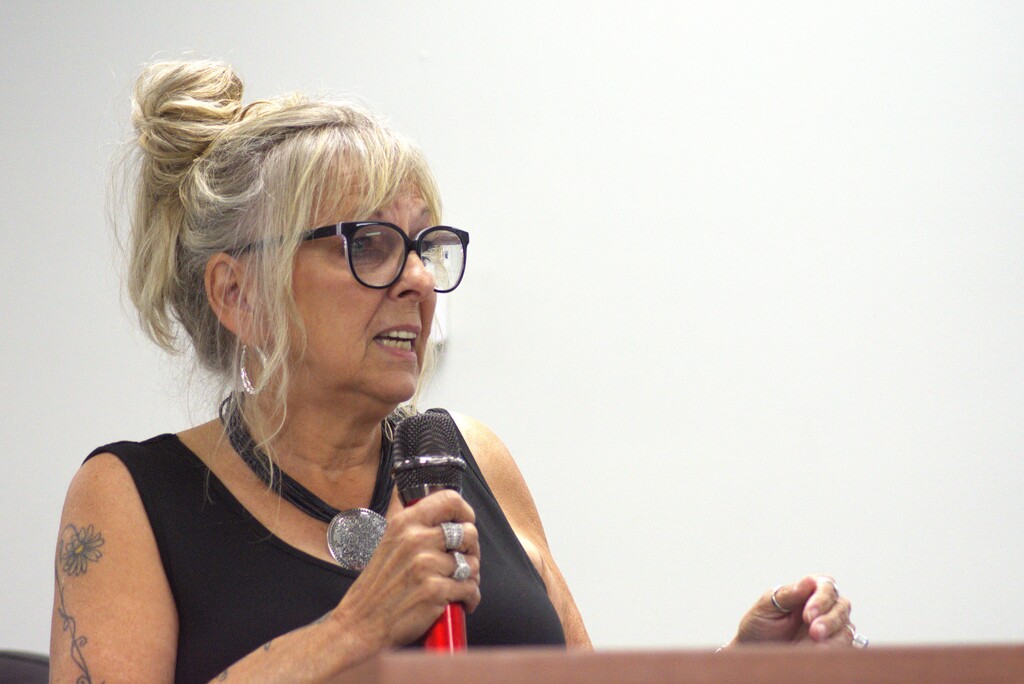
HOULTON, Maine — A rundown pigeon roosting building near Rollerama was transformed over the past two years into a modern grocery store for income-eligible Indigenous people living in Aroostook County.
And what started as a spark of an idea by Houlton Band of Maliseet Indians Tribal Chief Clarissa Sabattis and the Tribal Council became reality this week.
The food distribution center, part of the U.S. Department of Agriculture Food Distribution Program on Indian Reservations, is available for income-eligible Native American people as well as non-Native people living in a Native household. It is an alternative to the federal SNAP program.
“This is the culmination of many years of conversations and late nights,” Sabattis said on Wednesday evening during an official opening ceremony.

Located at 496 North St., the Houlton Band of Maliseet Indians Food Distribution Center is one of only three facilities of its kind in the Northeast. In 2024, there were 110 operating in the U.S., with 107 administered by Indian Tribal Organizations, according to USDA.
In FY 2024, $170 million was appropriated for the national progradm, with approximately $68.6 million for the federal share of administrative costs, and the remainder for food purchases.
According to Sabattis, the Houlton center was formed through an agreement between the tribal government and the federal government and represents another way to exercise the tribe’s determination in self-governance.
“It’s really important for our government to think about being able to provide for our people,” she said.
The goal of the program is to reduce food insecurity on the tribal reservation, improve nutrition and wellness, improve food quality, increase access to quality food, reduce obesity through consumption of healthier foods and educate tribal citizens on proper nutrition, according to the USDA.
Rosa McNally, the grant writer and manager for the project, said when the chief initially shared her idea, all she could think about was eating surplus food as a child. McNally recalled the oily pork in cans and peanut butter that had just a hint of flavor.
“Chief met with me and explained how this was different, and we went to the [Passamaquoddy] Indian Township center and there was beautiful food, and I was sold,” she said.
McNally and the center’s director, Travis Benson, literally started with pencil and paper and over time, the pieces began to fall into place.

The project came in at a little under $1 million, McNally said.
The tribe did most of the preliminary design work, forgoing architects and engineers, McNally said.
U.S. Sen. Susan Collins, a founding member of the chamber’s hunger caucus, said in a statement read at Wednesday’s ceremony that she has strongly supported assistance for those in need.
“I supported a $900,000 Indian Community [Development] Block Grant for the expanded food pantry that now hosts this new distribution center,” she said.
Each month, participating households receive a nutritionally balanced food package. They are able to choose from fresh, frozen and canned fruits, vegetables and legumes; proteins including beef, chicken, fish, pork, eggs, and bison, as well as dried or canned beans and soups, peanuts, and peanut butter; grains including pastas, cereals, rice, cornmeal and flour; dairy including cheese and milk; cooking essentials including vegetable oil, extra virgin olive oil and butter; and seasonal foods, including pumpkin, cranberry sauce and sweet potatoes.
Benson, the center’s director, has decades of grocery management experience, having worked as a Walmart manager for 24 years. Sabattis hired him two years ago to help get the program going from the ground up, he said.
They have about 19 families already enrolled from a soft opening, and about 17 more are ready to participate, Benson said.
As the program grows, they can just order more USDA food to meet increasing needs, he said.

Just like any grocery store, it offers home delivery and pick-up options.
“Every person in Maine and throughout the world deserves access to fresh and healthy food, and your efforts combined with the federal programming from the U.S. Department of Agriculture allow income-eligible neighbors to enjoy nutritionally balanced food,” U.S. Sen. Angus King said in a statement read at the opening event.
He added, “Most importantly, this program is going to ensure that no community member on the reservation goes hungry.”
Native people interested in applying for the program can stop into the center 7 a.m. to 5 p.m., Monday through Thursday, or contact Carrie Peterson (207-532-8919) or Travis Benson (207-267-0895) with any questions.







